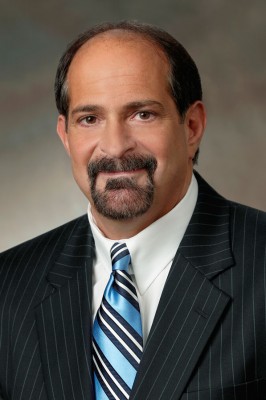Rod Nichols is well acquainted with both “streams” of an integrated oil company. Back in the late 1970s, when he first joined Marathon Oil’s HR department, he left the headquarters in Findlay, Ohio, to accept upstream assignments in Southern Illinois and as far away as Casper, Wyoming, and Anchorage, Alaska, learning the company and hiring for large Marathon production organizations all the while. He then switched to its downstream organization, taking on four years’ worth of HR management assignments at refineries in the New Orleans area and Texas City, Texas, before returning to Findlay in 1986. Those 16 years were a terrific learning opportunity for Nichols: he was a supervisor in Anchorage after only 18 months with the company, and he earned his “labor” stripes when he went through a strike at the Texas City refinery.

—Rod Nichols
Suffice to say that when Marathon became two independent energy corporations in 2011—Houston-based Marathon Oil and Findlay-based Marathon Petroleum Corporation (MPC)—Nichols did more than simply adapt. He joined Marathon Petroleum’s downstream operations as senior vice president of human resources and administrative services, using what he learned about HR on both sides of the company to build a strategy for success specific to MPC’s key needs.
One of these needs is easily summed up in two words: more talent. Due to the split of the company, MPC had to staff departments like treasury and investor relations from the ground up. The split also found employees in organizations like accounting and procurement divided between MPC and Marathon Oil—impacting the depth of knowledge for both companies. Finally, MPC was faced with the impending wave of baby boomers looking at retirement that is challenging many other organizations in the industry. “You’re always going to have some gaps [between the most and least-experienced employees],” Nichols says. “The best means to address it is by consistently hiring talent and giving them the proper training and experience so the company can be in the best position possible when people do start exiting the workforce.”
Nichols is quick to note that the hiring needs his company faces may not be as difficult as the task in front of his former colleagues, who work on the exploration and production side of the industry in a market like Houston; however, the sheer volume of hiring at MPC is much more significant, and the diversity of disciplines that the company recruits for provides a constant challenge. “We place more emphasis as one of our core competencies on being more commercially oriented,” Nichols says. “It’s not simply about an engineer going out and understanding how a particular piece of equipment works—it’s about understanding how that piece of equipment makes us money.”
When it comes to bridging at least some of that workforce gap, Nichols looks no further than MPC’s college recruiting program. Annually, more than 125 graduates from 40-plus colleges and universities infuse the company with required talent. Nichols reports that between 70 and 80 percent of the full-time hiring comes from MPC’s co-op/intern program, which he considers best in class. MPC brings in as many as 500 co-ops and interns annually in fields such as engineering, information technology, procurement, marketing, and accounting. These students do meaningful work and receive mentoring from seasoned coworkers. The programs provide an opportunity for the student and the company to learn about each other. “If there’s a match, it’s a pretty good predictor of future success,” says Nichols, adding that “candidates come in knowing the organization, which gives their career a jump-start.”
A robust, experienced hiring program supplements MPC’s college recruiting efforts by filling some of the more critical skill gaps, and was a key strategy in helping with the specific shortages that surfaced after the 2011 spin-off.
Throughout his career, Nichols has experienced the ups and downs of the oil industry and has learned that a hiring program won’t be successful if you don’t stay committed to it. “The one thing you don’t want to do when you’re trying to recruit talent is to shut off the spigot and then turn it back on every couple years,” he says. “You can hurt your reputation by periodically disappearing from campus.”
This is not to say all of MPC’s talent needs are satisfied through college recruitment. Skilled industry trades—people like welders, machinists, and electricians—staff the company’s refineries, terminals, and pipelines. Operators, truck drivers, deckhands, and boat captains are also required. MPC’s operating organizations, supported by their local HR teams, do a great job filling these key positions—which also have their ebbs and flows. “It’s cyclical,” Nichols says. “I can’t change the nature of the business, but I can try to level off the highs and lows—not get so excited and over hire when things are good, just to be in a bad position a couple years later. We need to keep the same mind-set throughout.”
For Nichols, the key is to ensure that MPC’s recruiting efforts extend beyond the HR function’s purview. “It’s not an HR initiative, it’s a collaborative initiative,” he says. “I think that’s just part of our culture here. We tend to operate as one large business unit.”

